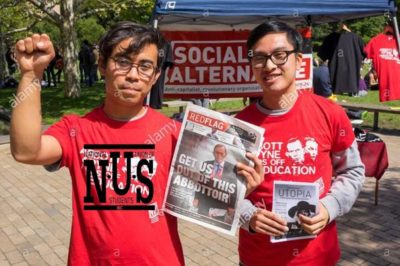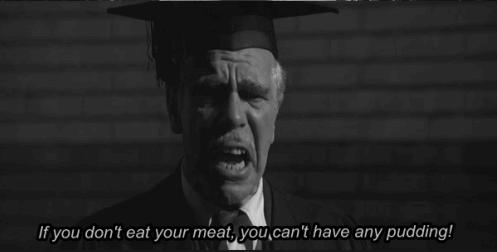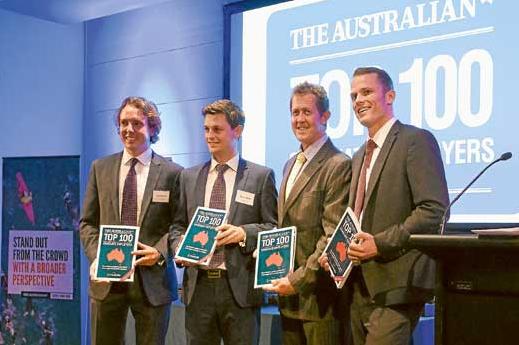by Brian Knight, 2008
There have been Nationalist student activities for three decades, but these efforts have been only pinpricks; however, as Australian Nationalism develops in the general community as a popular movement, the time has certainly arrived for a major campus push by our existing militants and by the new forces which will be mobilised.
The hour is late for Australia. The University is an important area for political struggle. We are urged on by our faith that the Australian Identity will not be extinguished on this Continent, that political and economic independence can be won for Australia, that a “Southern Nation” (Henry Lawson) will arise.
It is time for Nationalist students to acquire direction and begin to plan for the campus fight – soon to begin.
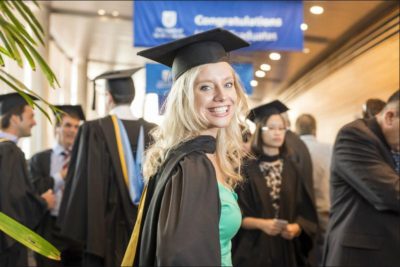 This is the misleading demographic image that universities in Australia promote on their websites
This is the misleading demographic image that universities in Australia promote on their websites
THE UNIVERSITY IN THE 21st CENTURY: CAPITALISM, OPINION-MAKING AND CULTURAL INTEGRATION
The University is not simply a place where students ‘learn,’ get a degree and are thus prepared for the workforce. (Indeed, they are least prepared for the workforce, because in sheltered academia student attitudes are reinforced to be more self-interested).
The University is a centre of power inside our economic-political-cultural order.
As a power centre for the Australian State, the University has a specialised function: its aim is to produce graduates who are able to “serve” as willing links in the economic and political organisations of this society, who have the ‘correct’ political opinions and who have personal-cultural values which can be imparted to others: i.e., liberal, globalist, values. If we strip away the mask of our ‘free’ University, we can see it as an instrument for social control.
Just as the ‘principle’ of Australian liberal capitalism for the general community is: CONFORM, CONSUME, OBEY, so this ‘principle’ is also enforced upon the intelligentsia of our society, albeit with one variation: the system makes the ‘promise’ of financial reward and occasionally – public recognition.
The link between the University and capitalism is demonstrable. Business and government fund various specialised ‘think tanks’; academics have their ‘findings’ published as epistles in the media; courses and specialised programs (and scholarships) interlink the University with local and international business needs.
Detailed research needs to be done to document these open and subtle links such that an effective propaganda can develop. For example, research into the new American institute at Sydney University would demonstrate the point. A University administration seeks to create an atmosphere of academic achievement, of ‘normalcy’ in its operation, to convince the student that it is a ‘wise’ machine dedicated to the common good; if its intellectual bases are at no point ‘contested,’ the process of ‘adapting’ the student to its programs goes without opposition.
Essentially, the University governs the mind through establishing correct ‘opinions’ in the course material. Economics courses ‘discuss’ globalisation, economic rationalism, international banking and the multinational as if we did not live in an epoch where fractious nationalisms are refusing to yield to a global village. Politics teaches that liberal democracy has emerged the victor of twentieth century ideological debates, that globalisation is inevitable, and that Australia is a ‘part of Asia’; indeed, ‘Australia’ itself is a political lie given that Australia was ‘stolen’ in the first instance by Europeans who have since accepted their guilt in the most submissive and humiliating manner.
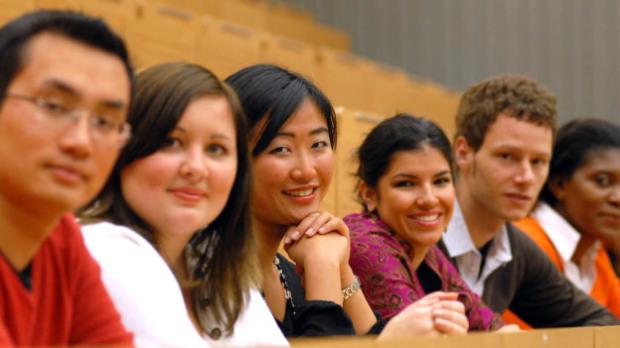 This is what you face in lectures…“Dad, get me outa here!“
This is what you face in lectures…“Dad, get me outa here!“
New courses in ‘Asian Studies’ replace our own cultural heritage, and Language Schools have been more richly endowed to teach us the tongues of our new partners in capitalist ‘rationality’ rather than the languages and texts in which our own traditions are written. Studies in anthropology teach the ‘out of Africa’ mythos of human origins, a partial truth that establishes (sic) the globalist myth of human sameness.
Of course, free debate may occur in a University; we may debate philosophy or theology or aspects of any subject material, but we would fool ourselves if we took the illusion of ‘freedom’ for its substance. Whatever we may ‘think,’ the course material will remain the same. And students, like academics must be careful. Too much freedom will draw censure – as in the case of Professor Andrew Fraser of Macquarie University who found himself out of a job for his linking of race and intelligence, of ethnicity and crime.
The University establishes its political clubs, its campus societies, its academic rules (no sexism, ageism, racism, ‘bias’ in the language of academic ‘Papers’ or otherwise) to enforce conformity. Debate is to occur within particular parameters although a few Left sects may be ‘permitted’ to operate as a sign of University tolerance. Yet, the Left does not essentially challenge globalism, only prattles about who should benefit from it.
Nationalism, naturally, is anathema to such a system.
No more and no less than a University in an authoritarian state, is the Australian University a machine for the silent psychic terrorisation of the student.
It was Antonio Gramsci who explained the importance of the dominant class of a society establishing the HEGEMONY of its ideological basis over other social sectors and rival ideologies. Hegemony implies the de-legitimisation of other views and an effort to force such views onto a plane where all are compelled to adopt the language/style of the dominant ideology. The subtlety of such an approach does not belie its coercive nature; to ‘unlearn’ the brainwash can be as difficult in our ‘free’ society, as it would be for a student in formerly Stalinist countries. When control is not ‘obvious,’ its existence can be denied. Critics such as ourselves can be denounced as heretics, just as European scholarship was once greeted as a violation of religious teaching.
The Nationalist student is soldiering in a political wasteland whose national achievement can only be the destruction and despoiling of Australia. It is a situation which would cause the strongest of us to ponder whether we can overcome the power arrayed against us. Nonetheless, the recognition of what we are fighting is the first necessary step.
(1) The University is an intellectual fortress of the State power. We must contest this power. Can we make virtue of our present weakness? Can we make capital from its seeming strengths?
(2) There is no interest for the Nationalist student movement in ‘provoking’ the Left sects; whilst we must expect to be campaigned against (i.e. “advertised”, even if misrepresented) by the Left, our concern must be the attraction of student youth to Nationalism and a general growth of our campus influence. A sterile ‘fight’ with irrelevant Left sects could not advance our agenda. It could find no echo amongst the student mass and would be a sure recipe for our marginalisation.
(3) Certainly, a standard Nationalist criticism of Marxism has value; it assists in defining the rudiments of our ideology. However, given that the chief task must be the development of ourselves to present an alternative to liberal gloabalist capitalism, we must not lose sight of priorities. It is liberalism which controls the university from its academic representatives, to its political clubs and the pervasive life-style of many students.
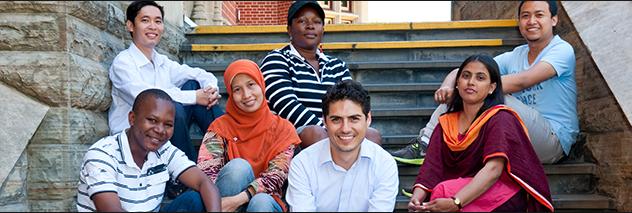 What you have to step over on campus…”Sorry no speaka Engrish“
What you have to step over on campus…”Sorry no speaka Engrish“
There is a certain ‘vacuum’ on Australian campuses which must be filled by Australian Nationalism. History has validated the Nationalist thesis that Marxism was simply – capitalism upside down and inside out. The Marxist ‘faith’ which preached internationalism, open-borders, the disappearance of all Nationality and a global economic order, has found consummation in these very policies applied (indeed refined) by modern capitalism. This incredible fact is worth repeating in our general philosophic propaganda.
However, we recognise that Marxism did once attract a certain number of idealists who, misguided though they were, did exhibit some revolutionary energy. Not all Leftists had this quality, but some did. The sociologist would tell us that Idealism and the University are old historical partners.
OVERSEAS STUDENTS: THE SALE OF EDUCATION AND ANTI-AUSTRALIAN DISCRIMINATION
There are now over 180,000 overseas students studying at Australian tertiary institutions. (“One-fifth of the students on Australian university campuses – 182,619 of a total 915,385 – are foreign, according to latest government figures.” Source: http://www.theaustralian.news.com.au/story/0,25197,23397992-12332,00.html (source since deleted by News Ltd)
On any fair estimation, this ‘programme’ raises billions of dollar for the State; it is big business. ($11 billion according to: http://www.universityworldnews.com/article.php?story=20080306105136387) *refer to end note.
It is a fact that DISPLACEMENT of Australians does occur; some ‘studies’ performed by the supposed experts confirmed this in the 1980s. Some 12,600 Australians missed out on a university place in 2008, as have countless tens of thousands over the last twenty years or more (Sydney Morning Herald, quoting a Universities Report, April 29 2008).
It is a fact that, ever since the days of the ‘Columbo Plan,’ an overseas student program has been a component of immigration; indeed, in 1971 at a Canberra symposium on the program, this was publicly acknowledged.
Nothing has altered and it seems the situation worsened; in 1989, Prime Minister Hawke granted permanent residence to 40,000 Red Chinese on the spurious premise that they were in some danger if they returned to the communist state because of their ‘support’ for democratic demonstrators.
Much of this ‘support’ seemed to have been generated AFTER it was realised that they could stay in Australia. These students ‘sponsored’ their families as migrants.
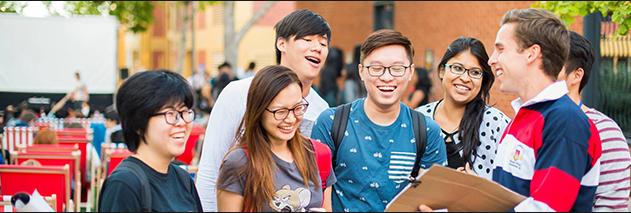 “Ok, I smiled for the uni advert.”
“Ok, I smiled for the uni advert.”
The overseas student program is a dangerous anti-Australian farce; it discriminates against Australians in their own country and should become a major general political campaign point for a Nationalist student mobilisation. The matter needs to be researched in particular detail that a national campaign can be mounted.
Overseas students are admitted to Australia for the money, to curry favour in Asia, to recruit ‘acclimatised’ migrants, to enmesh the lives of intellectual Australians with ‘Asian cultures,’ to expedite trade and investment.
The notion of training Australians FIRST, structuring educational resources for uniquely Australian tasks, developing Australian cultural-political values and expanding the volume of educational resources to achieve near-open universities – are all ideas lost on Australia’s political class. Australians cannot achieve their full potential under the racism of the current political order.
THE SITUATION MAY WORSEN.
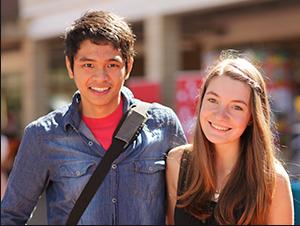 Then your daughter gets cucked and you’re White family is gonski
Then your daughter gets cucked and you’re White family is gonski
The universities themselves are willing and complicit in the anti-Australian policy: “Universities could mount a public relations campaign to make sure Australians do not turn against the education export market that brings large numbers of foreign students to Australian campuses” (The Australian, op cit).
This issue differentiates Nationalism from ‘racism’; in fact, the State in its denial of the rights of Australians in favour of aliens is – racist. The situation demonstrates the NATIONAL FUTURE in microcosm – the slow submergence of the Australian People into “Asia.”
The overseas student question is one where a small core of activists can cause intense discomfort at minimum cost and effort; the State and its campus groupies cannot argue a structured ‘case.’ It is certain this issue would win Nationalism – considerable student support.
A Nationalist government, would not only ensure that the interests of Australian students always come first – both in terms of places offered and in ensuring the highest possible standard of education in all areas of rigorous research and learning – but that their education would be provided to them free and WITHOUT DEBT.
The Higher Education Contribution Scheme causes degrees to cost tens of thousands of dollars. It is an obscenity that those who can least afford to pay are burdened – in some cases, for life – with this form of double taxation.
We end up with a class-based education system.
ESTABLISHING A NEW VALUES SYSTEM
To develop Student-Nationalism into a force, we should strive to establish a new values-system. This implies – the strong development of Nationalist ideology.
Student Nationalist leaders have the duty of urging the study of Australian History and Literature, of non-liberal philosophy, of organic sociology, various non-liberal political systems and ideas.
It is appropriate (given that our supporters, particularly those in ‘humanities’ are being educated by the State at its expense) the study of such things be carried out in ‘normal time’ with the guidance of the organisation.
For example, if a supporter was enrolled in an Australian history course, he would do better to study the nationalist White Australia theorists and activists (William Lane, William Spence, the ‘Victorian Socialist Party’ etc.) than the gold rush era; a sociology student would gain more in examining Robert Ardrey and Konrad Lorenz than in reviewing ‘structuralism’ and so forth.
The education of Student Nationalist cadre can proceed – in the State’s time and with its reward – the degree. It is simply a matter of the Nationalist organisation pursuing such a programme with diligence. Where other students are involved science, medicine, etc.), the organisation requires ‘readings’ in suitable material to lay down that ideological basis, systematic ‘booklists’ and other theoretical items.
‘Values’ are also more than ideology. It is personal attitude which is at issue. The liberal may come in the mode of the career-orientated studious type or the ‘weaker’ mode which generally ends up staffing some form of State Lie Factory (media, education, etc.). We must demonstrate a certain ‘morality,’ honesty and commitment; those Nationalists who make their allegiances known represent not just themselves, but others.
A conscious effort must be made to participate in every area where Australian culture (and not cosmoculture) is displayed or actualised. Campus regiments, sports associations, music groups etc. are all fields not simply of personal / relaxation or endeavour, but for Nationalist recruitment and counter-culture action. It should be recalled that ‘alternative’ values-creation lay at the centre of the Left-student movement thirty years ago and it enjoyed some success. We need to examine the same method; we can show that we possess the ‘Australian Character’ which the liberal – does not.
In some cases, it may be possible covertly to ‘takeover’ certain campus societies and use the resources to inculcate Nationalist values and ideas – whether we ‘announce’ ourselves too openly or otherwise. It would ensure a year-by-year development of new Nationalist minded students. With public Nationalist action, disruption of liberal-life and the implanting of Nationalist consciousness, we would be performing our duty – winning young Australians to the defence of their Identity.
NATIONALIST STUDENT ACTION:- VOTING NATIONALIST: LOCATING ISSUES. BREAKING THE TERROR OF THE OPPOSITION. MOVING INTO THE 21st CENTURY WITH A UNIVERSITY BASE.
Our objective is to become the most public, energetic, student force; there are some 500,000 European-Australians or more studying in every form of tertiary institution.
We have to reach them.
There are general issues of campaign and particular local issues; each campus group must assess the circumstances. It is important that we consider the placing before the students, on as many campuses as possible, and as often as each campus can sustain it, candidates for student representative council offices (e.g. President, editor of campus newspaper, etc.). We can expect controversy. We know that questions such as overseas students, fees, misuse of funds by ‘politically correct’ groups are always issues and often they admit of peculiar local applications.
We have to show that there is a bloc of Nationalist support and hence break the first barrier. We have to demonstrate that we are ‘present’ and that we will not go away.
If it was possible that, each year henceforth, candidates appear in several campus polls as an obvious aspect of a national effort, the effect would be all the greater.
However, our other task must never be lost sight of; we have to break the terror of the opposition. Intellectual-liberalism may be the power in every faculty, but it rests upon people. We need to practise ruthless exposure and criticism of the liberal academics who sustain State policy and who perform ‘the brainwash.’ These dross are not often noted for their courage.
In this regard, we need to develop tactics of SABOTAGE.
Their ‘think tanks’ need to be infiltrated and subjected to various forms of disruption. Their academic lives have to suffer destabilisation. Their classes must be ‘assailed’ with ‘objections.’ Leaflets, posters and other material must appear. These persons must appreciate that a new era of student protest has begun and they are the targets. In this regard, we strike at a key prop of the traitor-State.
But campus liberalism has other components. ‘Anonymous’ Nationalists should silently infiltrate (a job for each new year’s ‘intake’ of Nationalist activists) any obnoxious campus societies. There are numerous ways to kill off a deserving group and we must practise every one. We must efficiently vandalise their public material.
Each group may carry out particular public activities (e.g. literature display, book sales, etc.); however, we must be careful to shield some of our support from prying eyes. These patriots can work more easily to spread our message through direct discussions with students over lunch or in tutorials or in covert conversations. Their task must be to permeate the campus with a new ‘air’ of Nationalist dissent.
Once our activities affect the impression of a MOVEMENT IN CAMPUS LIFE, we are no longer a ‘sect’; we are a self-sustaining force with a secure base.
THE NATIONALIST STUDENT AND THE POLITICAL DEVELOPMENT OF AUSTRALIAN NATIONALISM: THE OFF-CAMPUS QUESTION
The University has been defined as a ‘Base’ area for Australian Nationalism. It has also been defined as a major area of political contestation.
The University situation demands a specialised form of Nationalist organisation, but that organisation cannot be isolated from the broader off-campus question.
The political struggle for Australian Independence and Identity is set to intensify as this century progresses; the Student movement will play a crucial role in the development of Australian Nationalism. Nationalism requires articulate spokesmen and spokeswomen; it needs writers, organisers and leaders who can understand the line-of-march. In the final analysis, Australian Nationalism must be possessed of a political cadre which can fight, and win the battle with the traitor-State and replace its institutions with new structures. The youth who are attracted to Australian Nationalism now are those who will be playing important roles in the Nationalist struggle for political power., say ten years hence.
The University struggle is training for the broader national-revolutionary struggle. The dirty-tricks, the campaigning, the years of ideological study are those ‘small’ details learned in our youth. Years later the political canvas can be painted with the broader brushstrokes derived from richer life-experience. But our formative years are crucial.
The specialised Nationalist student groups may have to be flexible in their ways, but can only benefit from the integration of their work with off-campus Nationalist structures. From that quarter, information, legal advice, ideological materials and funds can be provided. Nonetheless, they need to develop independence of initiative and political will, traditional traits of our Australian Character.
The enemies we face on campus today – we will face again in the broader struggle unless they ‘know’ that our commitment to destroy the liberal order is stronger than their courage in sustaining it.
It is a war. Liberalism must be choked of its future supporters; if we cannot ‘convert’ these forces, we should intimidate them, just as now they intimidate our supporters.
The force of psychological intimidation is a strong one; these liberals should feel that the public expression (or even furtive expression) of their mis-faith will draw the censure they cannot live with. We are political guerrillas.
In this regard, we are aware that we have to fight for our ‘free speech’ because there is no real freedom in the liberal-university today, just as there will be a definite struggle against anti-Australian liberalism in the Nationalist university of tomorrow.
The future begins – today.
The formative Nationalist student groups are not primarily organisations for the discussion of ideas (although that discussion should occur), but organisations for the operation of a detailed political attack upon liberalism.
In that sense they are fighting organisations which use both open and secret methods to arrive at certain results. These methods are similar to those employed by the Left in the late ’60s and early ’70s.
Our objective is to show that Australian patriotism lives, not only in the streets, factories and offices – but in a milieu very special to the local Traitor-State, at the very place where it reproduces the ideas that sustain it and recruits the staff who occupy its higher agencies.
In this environment, the State cannot be seen to ‘introduce’ into it directly its secret policemen, its laws against free expression and its media driven smears; it must fight with those resources it has. It is a question of who will command the greater reservoir of determination.
UNIVERSITIES UNDER STATE PRESSURE
The University scene is one under intense pressure It is being recrafted to faithfully reproduce the liberal society, both in its ideological and in its commercial aspects. In that regard inconvenient free inquiry schools suffer from the hand of economic rationalism. The 2007 curtailing of the School of History at the University of New South Wales is a case in point. Although this department was certainly liberal, it allowed too much free inquiry and too much reflection upon Australian history – which does not serve the process of globalisation.
A leftist who reviewed the radical-movement at La Trobe University (1969-73) said of it: “Student movements arise during periods of acute and rapid change in institutional structures and traditions are made obsolete or less relevant.”
With the State pressure to sell education to overseas students which displaces Australians and binds universities to this ‘market’, to maintain high fees for all degrees, to limit scholarships, to charge for all postgraduate study and to rationalise courses, a pool of anger and resentment is being created. There is no voice to this discontent. A new Nationalist student reaction is in the formative stage, part of a broad stream of patriotism.
A nationalist student movement may draw upon foreign examples of both Left and Right, from the present and the past and from Australian examples in similar vein. But it will have to tread its own pathway.
The task now is for us to turn our thoughts into positive action.
Australian nationalist student organizations advance a fighting programme which mobilizes a new movement and challenges the liberal ideology that dominates our university life.
A PROGRAMME FOR STUDENT NATIONALIST ACTION: Take Back Our Education System!
Overseas Students:
The overseas student program must be wound down to a negligible number of selected persons.
Once current overseas students complete their degrees they must return home; studying in Australia is not a ticket to win migration rights to Australia where they would be competition in the labour market and a loss to their parent country.
The process that allows foreigners to study in Australian high schools and then enter Australian universities and not be classed as overseas students – must end.
NATIONALIST PRINCIPLE: No place should be offered to any overseas student if it displaces an Australian.
University Fees:
All universities shall be free upon the appropriate entry standard.
All Higher Education Contribution Scheme debts shall be abolished.
All students shall receive appropriate financial assistance during their course periods.
University Funding:
University funding should be regarded as a national priority on par with defence, health or ecology.
The State should support to the limit all Australian (academic and student) scientific and similar research and all proper research in the social sciences that defines the Australian heritage or defines our social or other priorities.
Cultural Revolution:
The Australian university shall undergo a revolutionary change, where liberal ideology, whether in its capitalist or marxist guises, shall be combated and displaced. Our universities shall interact staff and student as joint agents of democratic control in a professional academic environment. The University should have special representation in the Australian Parliament.
[This article was originally entitled ‘Australian Students Unite: Nationalist Student Activism: New Perspectives On Ideas, Strategy and Tactics For A New Movement’, by by Brian Knight, source http://ausfirst.alphalink.com.au/studentsunite.html]
*End Note
It took seven years before an Australian government reacted to the transformation of European higher education that had begun in 1999. The response finally came early in 2006 and was framed as a sharp warning to Australia’s vice-chancellors: Watch out! The then federal Education Minister Julie Bishop told university chiefs in no uncertain terms that they could lose tens of thousands of fee-paying foreign students to European institutions unless their universities adapted to the Bologna process.
If Australia was not aligned with Bologna developments, a significant proportion of the 32,000 Europeans then enrolled in Australian institutions could find other destinations more attractive, Bishop said. Similarly, if Asian countries or institutions chose to follow the Bologna reforms, Europe could become a more attractive destination for students who would otherwise have come to Australia.
The challenge was how to better fit Australia’s frameworks with international standards and benchmarks while retaining a higher education sector that met domestic and international expectations of quality. Releasing a discussion paper on Bologna, Bishop said the process also had implications for European acceptance of Australian higher education awards and options for student mobility.
The paper, prepared by her department, said it was intended to stimulate debate but, although there was a flurry of media reporting at the time, almost nothing has been heard of Bologna since Bishop fired her warning shots. Her paper noted that compatibility with Bologna would closely align key features of the Australian higher education system with the university systems of European countries and would assist student movement between universities while boosting other types of engagement between Australian and European institutions.
In a 10-page response to Bishop and the departmental paper, vice-chancellors were frankly sceptical of the claims of impending doom unless Australia acted. They said it was first necessary to clearly define what ‘alignment’ meant in the Australian context and proposed that it should be ‘comparability’.
This would ensure that the diversity of the Australian education system could be maintained and would not infer standardisation – which was clearly an element implicit in harmonisation. Attempts to work more cooperatively with Europe should not include restructuring the Australian education system, the document stated.
“Acceptance of the meaning of aligning ourselves with Bologna is an important first step in the process of consultation… A fundamental precept of any possible future comparability with [Bologna] must be the strong features of Australia’s higher education sector and should not be at the expense of the national system that has proven successful in developing and diversifying Australia’s international student recruitment.”
Then last November, the conservative government of Prime Minister John Howard was swept from office – and Howard from his own seat as well. With the Labor Party now in power, Bishop’s demands that universities take up the issues raised by her and the departmental paper have disappeared along with the Minister herself.
“Any sense of urgency that may have existed has dissipated with Julie Bishop now in Opposition,” said Dr Glenn Withers, chief executive of the vice-chancellors association, Universities Australia. Withers noted that, coincidentally last November, his organisation had hosted a delegation from the European University Association to specifically discuss Bologna.
“This affirmed strongly how much Australian degree structures are reasonably close to the Bologna model, more so than some European university systems,” he said. “Nevertheless, continuing to work with the developments of the Bologna process allows us to participate in developments in global higher education and learn from European activities. We also have a priority of maintaining diversity in Australian universities while enhancing our ability to link with Asia Pacific and American institutions as well as European universities.”
Withers said vice-chancellors believed the small differences that did exist between Australian degree structures and the Bologna model had not inhibited universities from developing informal links with European counterparts, including student and academic exchanges, and research collaboration.
The paper prepared for Bishop, however, warned that although students and academics did move between Australia and Europe, and that Australian qualifications were recognised in Europe, impediments resulting from differences in systems and basic structures still existed. In particular, differing degree structures could make recognition of qualifications difficult while the absence of effective credit transfer arrangements meant students could not easily undertake portions of study in another country.
It said Australian universities could lose out to Europe in the lucrative overseas education market which was worth A$8 billion (US$7.4 billion) a year to Australian universities at the time – although this has now grown to more than $11 billion. Foreign students were likely to be attracted by the increasing use of English in many European universities at postgraduate level, the competitive fees and the potential access to the European labour market which was nearly 20 times the size of Australia’s.
“The attractiveness of Europe relative to Australia is likely to be greater if Australia remains outside the Bologna tent,” the paper said. Referring to the European Credit Transfer and Accumulation System (ECTS), it highlighted the lack of a uniform national system of credits in Australia, saying this was a significant impediment to mobility.
To be “inside the tent”, Australian compatibility at the minimum would entail a three-cycle structure with bachelor, masters and doctorate degrees. A Diploma Supplement, a credit system compatible with the ECTS and an accreditation-quality assurance framework meeting Bologna criteria would also be necessary.
Australia’s one-year masters courses would need to be monitored because, while there was scope for a one-year masters within the Bologna structure, the paper said a two-year masters was likely to become the norm in most countries.
Withers, though, was confident that any problems arising from the differences that did exist could be resolved. Australia’s major market in terms of international student movement was Asia and universities needed to be able to blend with what was happening to Asian institutions as well.
“Overall, we believe things are proceeding very well as far as Europe is concerned. It’s a case of hastening slowly,” he said.
